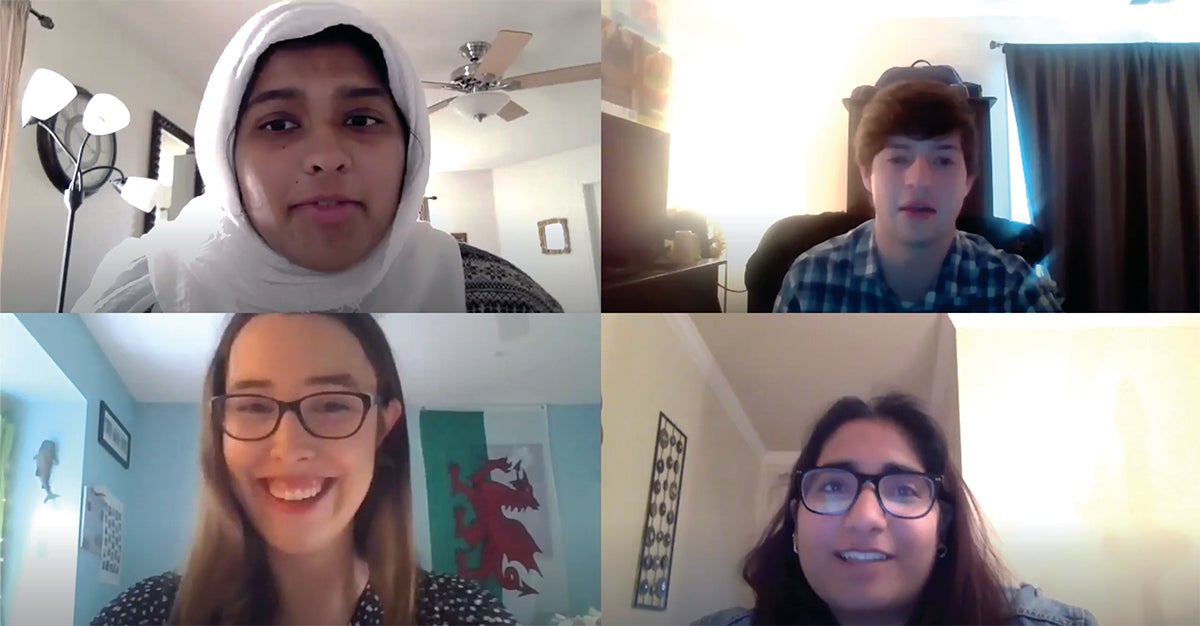CAC Hosts Virtual Colloquium for Research in the Social Sciences and Humanities
Each year since 2017, the College Academic Council (CAC) hosts a Colloquium for Research in the Social Sciences and Humanities (CRSSH). This year the students presented their research virtually due to the COVID-19 pandemic.
Presenting Research Virtually
CRSSH is an annual conference that allows students doing research to present in front of their peers and professors. Traditionally, submissions are in the form of papers, posters, performances, videos, pieces of art, and any other form of presentation which falls broadly within the fields of humanities and social sciences.
This year, the undergraduates presented their research virtually through video and PowerPoint as a workaround for the new online learning environment Georgetown adopted in response to COVID-19. Four students participated in the panel presentations moderated by Coilin Parsons, a professor in the Department of English
Mayesha Awal
Mayesha Awal (C’20), a double government and psychology major discussed the findings from her research “Predicting Procedural Justice and Legitimacy: Youth Mental Health and Wellness.” Her study found that individuals who view the justice system as legitimate are more likely to obey the law, and it is, therefore, important to support youth by creating trust through community service.
“The most important thing for the city to have is training for law enforcement and police followed by surveys given to the youth and judges….the training system should be personalized,” says Awal.
Initially, Awal planned on researching whether gang membership predicts utilization of community services, but this data was restricted on a computer that did not have internet access on campus. As such, Awal adapted her project so that she could use the public data available.
Nick Giotis
Nick Giotis (C’23) is a first-year economics and theatre and performance studies major who wanted to become involved in independent research early in his academic career. His presentation analyzed “The Holistic National Progress Index (HNPI)” as a replacement for the Human Development Index.
Currently, the Human Development Index is a country’s overall commitment to human development that incorporates economic development with human development. However, this system relies heavily on the GDP and does not recognize improvement over time. HNPI wants to improve upon this by basing the numerical value of each country on a comparison to their peers that will be determined by eight indices including education, health, crime and justice, GDP, sustainability, happiness, equality, and peace.
“The idea that economic growth is the way to quantify human progress seems so backwards to me and the work done by the UN to address that was laudable,” says Giotis. “I talked to Professor Rogers in the economics department who said, ‘It doesn’t matter how you do it, but how you do it has to matter.’”
Rachel Singer
A sophomore studying history and linguistics, Rachel Singer (C’22) examined the Irish literary influences in an Icelandic saga of Laxdaela, which depicted the kidnapping of Princess Milkorka. Singer wanted to look into the similarities and differences between this saga and others by comparing Irish literary devices to Irish texts.
Most Icelandic sagas were written by descendants of Vikings 400 years after the fact. Singer found that while these sagas had Irish literary motifs, they were overwhelmingly Norse. This implies that Vikings saw Irish culture as similar to their own, but above all emphasizes Norse contact with the wider world was not limited to conquest. She said that the pandemic has allowed her to focus more on developing her linguistic skills.
“At the beginning of quarantine, I could not read any old Norse, but I have been able to study it extensively over the past few months, which I am hoping will help in projects in the future,” says Singer.
Sonali Mirpuri
Senior Sonali Mirpuri (C’20), a government and history major also minoring in education, inquiry and justice, entitled her thesis “The Microhistory of the Ben Ali family.” This thesis, which Mirpuri researched with the help of her mentor Ananya Chakravarti, relied on archival data as well as interviews with members of the Ben Ali family, who own the landmark D.C. restaurant “Ben’s Chili Bowl” to outline the complex narrative of identity.
Mirpuri’s thesis was divided into chapters that examined different periods from Ben Ali’s life, including his time in Trinidad, to the opening of the first Chili Bowl in D.C., to how his three sons have constructed their own identities from their father.
“From the results, I discovered the fluidity and dynamism of identity as a whole,” says Mirpuri. “It is socially constructed and historically maintained.
